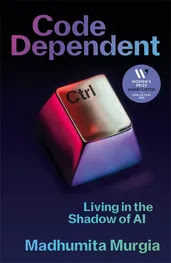Proponents of AI may loathe at the idea of pinning down technology’s dramatic progress in its early days, however, the glaring fact is that limiting human ability to decide and direct its actions hold fundamental contradiction to our evolution as a species. Little is known about how machine-learning models draw statistical inference from volumes of data at its disposal. With quantum computing set to exponentially enhance machine’s ability to intuitively mimic processes, the advent of AI raises more questions than answers.
Code Dependent is not about how technological infusion is empowering algorithms but how AI has insidiously entered our lives and altered the very experience of being human. With over a decade of experience in writing and reporting on AI for the Financial Times in London, Madhumita Murgia explores what the rise of AI means for us as a society. It is a story on AI with a human face, told through the lived realities of nine unrelated persons from across the world. The stories are chilling, calling for an urgency to act before AI takes over. What comes out is an absorbing and engaging narrative.
These stories look at everyone from underpaid gig workers to an activist, a refugee, a single mother, a doctor, a bureaucrat, and a priest. Through these case stories, Murgia examines all the relevant facets of life, from livelihood to society and from freedom to future. What comes out clear is that ‘surveillance capitalism’ is the denominator which guides the business model that monetizes personal data. Amid all the hype and frenzy around AI, there is little denying that the prejudices of those who create it gets amplified. For instance, facial recognition camera is biased towards fair skin, religious minorities, migrant and refugees, and religious minorities. Backed by data colonialism by tech-giants, any scalable system under the capitalist economy is built to benefit large groups while excluding the other. This can only trigger exclusion and inequality.
Each of the stories make it clear that AI is out to compromise our agency and shatter our illusion of free will. Data workers are as vulnerable as factory workers, they remain an undervalued bedrock of the AI industry. The algorithms that create deepfakes target women, who are hypersexualized by technology. Facial recognition has empowered police to exercise nuanced judgement, promoting widespread human rights abuses. In a world wherein AI promotes surveillance, censorship and control, freedom is the first that gets compromised with dissent becoming irrelevant. The stories in the volume are disturbing, exposing powerlessness and vulnerability in a world turbocharged by AI.
Generative AI has raced through the economy without any of the compelling questions being addressed. Will so-called knowledge workers still have work in few years' times? Who owns the rights to all of humanity’s creative outputs? Will white collar jobs continue to exist as they are? How can a society be sustained without work? The trouble is that people – scientists, economists and politicians – who are supposed to have answers to such questions are as much in dark. In the post-truth era, controlling AI from producing false or biased contents will remain a challenge.
Murgia is clear thar AI is a way to augment human intelligence and solve impossible problems but has utility when it preserves human dignity. To preserve human agency, the author has drawn a checklist of guiding principles to ensure that algorithms are not without ‘algor-ethics’, a basic framework of human values to be agreed upon by multiple stakeholders around the world and implemented by machines. Written with empathy and deep concern about the future of mankind, Murgia raises question on the unrestricted idea of selling back our dreams repackaged as the products of machines. Code Dependent makes for compelling reading as it concerns everybody. It concerns the impact of AI on our collective future.
by Madhumita Murgia
Picador India, New Delhi
Extent: 311, Price: Rs. 699.



